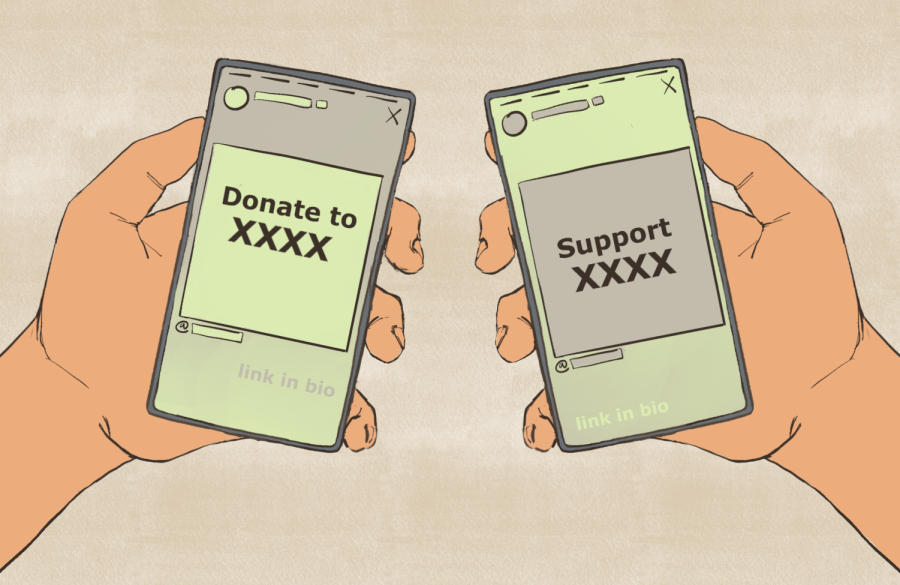Justice requires more than an Instagram story
Exploring the ineffectiveness of social media slacktivism
Instagram feeds get filled with new stories and online activism links, but that alone isn’t enough to truly make an impact.
November 28, 2022
You don’t need to post about an issue to prove that you care and want to take steps to address it.
An Instagram story linking to a video of police brutality. Twitter posts linking to an article about the current Iran protests. These posts, more than effecting change, are simply part of a racing flurry of opinions and news stories shared and sources of trauma porn for the victims subjected to the cruelty of the social ideals accumulated by our society.
We can’t deny that social media has played a significant role in modern activism. It has facilitated monumental movements, from Arab Springs to #MeToo. It gives the public a platform to spread information, share opinions and highlight the severity of issues. However, at the same time, posting on social media has become performative rather than purposeful. Disingenuous rather than informative. Lethargic. Ineffective.
When videos of George Floyd’s murder surfaced on the internet, it sparked anger and grief, highlighting an issue that has remained in the dark for far too long. Blackout Tuesday, an initial attempt by the music industry to protest against police brutality, was plagued by the disturbing frequency of blacked-out social media posts, which weakened the intended message.
Posting black boxes on Instagram and hashtagging black lives matter is rendering the the hashtag usless. Remove the hashtag so actual BLM posts can be seen. #blackouttuesday #BlackLivesMatter
— TATIANNA (@TATIANNANOW) June 2, 2020
Despite the 1,034 people killed by police this year, only a few filled media headlines and spots in social media posts, while the rest are simply forgotten. It is when this cycle of a temporary digital memorial continues that it becomes futile. It desensitizes us to inhumane acts, restricting them to, in our view, issues worthy of nothing more than a mere post.
These acts of mere recklessness are known as slacktivism, a term coined to define an obligatory act of activism to show “care” toward a current issue.
These Instagram stories, linking news stories to highlight an issue, last only 24 hours and probably only 24 seconds in the hearts of those who view them, manufacturing an instantaneous rush of outrage. But after an hour, a day or a week, that anger disappears, just like the post.
Now, with the Iran protests, we continue to practice the growing institution of passive slacktivism. Reposting a headline isn’t a genuine step toward justice. It’s a mere self-invitation to the endless queue of bystanders watching others fight for equality because we aren’t bold enough to join the fight ourselves. While Iranian women are going out in public, risking their lives by tearing off their hijabs and burning them to exemplify their strife, we simply watch and repost.
Watch: A Swedish politician cut off her hair during a speech in the European Parliament to show solidarity with anti-government protests in Iran that were sparked by the death of Mahsa Amini in police custody. pic.twitter.com/jAG23RmEUG
— DW News (@dwnews) October 5, 2022
If we want to use social media to spread a message, merely reposting Instagram posts isn’t enough. A research study examining the significance of social media platforms in politics underlines how the potential positive impacts of social media activism include “helping give a voice to underrepresented groups” and “making it easier to hold powerful people accountable for their actions.” Social media gave us a platform to come together and publicly shame men who were once considered influential for their inhumane sexual behavior amid the #MeToo movement. However, as social media moves inevitably from one event to another, leaving rectitude for an issue unfinished, we end up achieving nothing except an instantaneous and rather weak sense of opposition before that anger moves on to the next injustice. Instead of following where social media is going, pick an issue that you care most about and delve deeper into it.
You can start by finding politicians who are taking reasonable steps to mitigate the surfacing issues and support them. Write letters to them, acknowledging your support for their efforts and maybe even suggesting other solutions. Following what you preach, not limiting your activism to social media but to live protests. Speak up against microaggressions and suggest solutions. Aside from activism, we can make an impact by unlearning innate microaggressions and demonstrating what we believe in through day-to-day interactions. Call out inappropriate and insensitive conversations and support businesses owned by minorities. While these steps are harder, they are momentous, each action leading to more — to change.


















